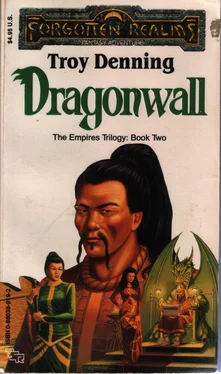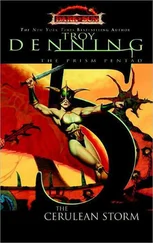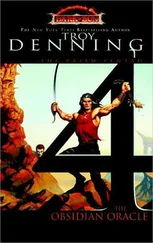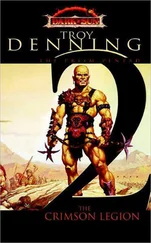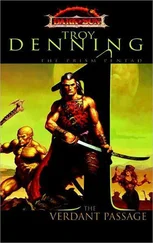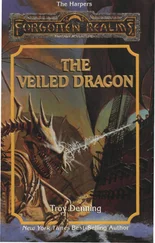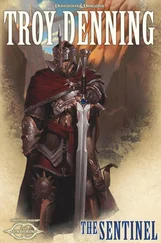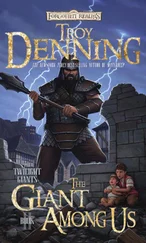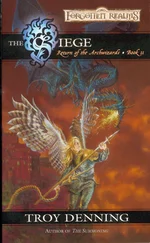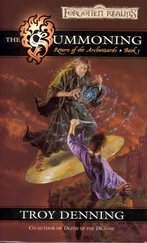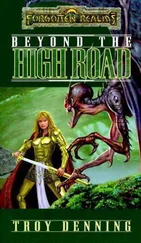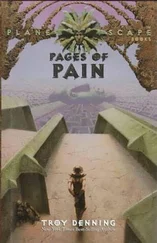Troy Denning - Dragonwall
Здесь есть возможность читать онлайн «Troy Denning - Dragonwall» весь текст электронной книги совершенно бесплатно (целиком полную версию без сокращений). В некоторых случаях можно слушать аудио, скачать через торрент в формате fb2 и присутствует краткое содержание. Жанр: Фэнтези, на английском языке. Описание произведения, (предисловие) а так же отзывы посетителей доступны на портале библиотеки ЛибКат.
- Название:Dragonwall
- Автор:
- Жанр:
- Год:неизвестен
- ISBN:нет данных
- Рейтинг книги:3 / 5. Голосов: 1
-
Избранное:Добавить в избранное
- Отзывы:
-
Ваша оценка:
- 60
- 1
- 2
- 3
- 4
- 5
Dragonwall: краткое содержание, описание и аннотация
Предлагаем к чтению аннотацию, описание, краткое содержание или предисловие (зависит от того, что написал сам автор книги «Dragonwall»). Если вы не нашли необходимую информацию о книге — напишите в комментариях, мы постараемся отыскать её.
Dragonwall — читать онлайн бесплатно полную книгу (весь текст) целиком
Ниже представлен текст книги, разбитый по страницам. Система сохранения места последней прочитанной страницы, позволяет с удобством читать онлайн бесплатно книгу «Dragonwall», без необходимости каждый раз заново искать на чём Вы остановились. Поставьте закладку, и сможете в любой момент перейти на страницу, на которой закончили чтение.
Интервал:
Закладка:
As his adjutant obeyed, Batu watched the charge. The cavalry closed to a hundred yards. Determined not to reveal their commander's strategy until the last minute, the officers on the exposed flank did not order the retreat. For the first time in his life, Batu wished his subordinates were not so brave. If they did not withdraw soon, it would be too late. The riders would overrun them and cut them down from behind.
Pe returned to Batu's side. "The message is sent," the adjutant reported. He pointed at the hilltop. "But we're too late."
The general looked up and saw the advance formations of the Shengti and Ching Tung armies cresting the summit. They had brought their bulky artillery with them, and thirty catapults of moderate size lined the hilltop. Behind each catapult were several wagons filled with steaming pitch. The artillerymen carried torches.
"Fools," Batu said, pointing at the sea of Tuigan. "Do they think a brush fire will stop that?"
"Perhaps they intend to burn the artillery and push it down the hill to obstruct the charge," Pe suggested mockingly.
"They'd kill more barbarians," Batu replied, eyeing the catapults angrily.
An urgent din of voices rose from the western end of the field. At last, with the enemy horses less than fifty yards away, the flank began its retreat. As the line folded, companies along its entire length began to withdraw. Batu cursed. He had intended the line to turn back on itself neatly, not in a mass, but he had not had the opportunity to explain his plan in person. Now, the officers in the middle of the line were giving their orders prematurely, and the general had no doubt the result would be grave.
Within seconds, the Shou lines had become a jumble as retiring units ran headlong into each other. In indignant confusion, the officers began cursing at their men, then at each other. The disarray of the commanders quickly took its toll on the morale of the infantrymen. They began to flee away from the horsewarriors in any available direction. As Batu had ordered, the officers tried to guide their panicked charges toward the marsh, but hundreds of men were instinctively fleeing uphill, toward the reinforcements.
Batu could not save those men. When the armies of Shengti and Ching Tung charged down the hill, the cowards who had disobeyed their officers would be trampled-a fate Batu felt they deserved.
On the other hand, those who had kept their heads would need him when they reached the marsh. Batu sprinted for the reeds, calling for Pe and the runners to follow. As they descended the hill, the ground quaked more violently. Screams of horror and anguish came from the far end of the field. Without looking, the general knew the enemy's first line had caught his men.
As he approached the bottom of the hill, Batu saw a mass of Shou infantrymen gathered in the marsh. The general stopped thirty feet up the hill, directly above the reed bed, and pointed at the bundles of bound rushes.
Addressing the runners himself, he said, "Tell those men to take reed bundles and jump into the river."
The runners glanced at each other, but quickly bowed and rushed to transmit Batu's command to the throng.
Looking at the turbulent waters of the river, Pe asked, "Do you really think the men will follow your order?"
Batu looked west. The horsewarriors were charging down his line almost unimpeded, trampling and slaying every living thing in their path. "Do you think they won't?" he countered.
A series of booms sounded from the hilltop. Batu looked up and saw several catapult-spoons crash against their cross bars. Dozens of flaming pitchballs streaked overhead, landing on the far side of the battlefield and setting fire to the sorghum grass.
A less experienced officer might have thought the catapults had overshot their targets, but the general knew that it would have been impossible to miss the Tuigan horde. The artillerymen had been instructed to aim past the barbarians, trapping the enemy between a wall of fire and the armies of Shengti and Ching Tung.
Though the tactic blatantly sacrificed Batu's army, the plan was a good one-or it would have been, had Kwan taken the time to scout his enemies. As it was, however, the minister had trapped a tiger in a paper cage.
While the artillerymen cranked the catapult spoons down for reloading, four thousand archers rushed over the hilltop. They took a position overlooking the sorghum field and began to fire volleys at the Tuigan riders. The routed soldiers that had been fleeing uphill stopped in their tracks and crouched in grass, fearful of putting themselves between the bowmen and their targets.
The barbarians ignored these developments and continued to charge. Batu's soldiers were dying by the dozens.
"My general!" Pe gasped, staring in open-mouthed horror at the destruction of the Army of Chukei.
Batu laid a hand on his adjutant's shoulder. "Don't despair, Nii Pe. Isn't this what armies are for?"
In the minutes that followed, perhaps two thousand pengs reached the marsh and dove into the swollen river, clinging to bundles of reeds. Aside from a steady stream of wounded stragglers, the other three-fifths of the Army of Chukei lay in the sorghum field. Blood had turned the yellow soil to the color of rust. With his army scattered, Batu had nothing to do except watch the battle. He and Pe remained near the bottom of the hill, thirty feet above the marsh.
The fight began to turn in favor of the Shou. The barbarian charge foundered as horses began to stumble in the mass of dead bodies. The Shou archers fired volley after volley into the churning horde. Small groups of Tuigan tried to mount assaults up the hill. Each time, they met a hail of shafts. The riders in the rear were unhorsed as their dead fellows came tumbling down the slope. The barbarians could not escape the fatal rain across the sorghum field, either, for the valley was engulfed in fire. Nor could they return the way they had come, for their fellows continued to press forward, unaware of the gully of death ahead.
Batu was as amazed at the effectiveness of the minister's plan as he was bitter about the sacrifice of his army. He had never expected the old man's trap to function so efficiently. Though Kwan had sacrificed one small army, it appeared that he would destroy the largest part of the barbarian force without exposing the Armies of Shengti and Ching Tung to a single assault. The battle was an incredible feat of tactics, and the general had to admire his superior's planning.
Batu's thoughts were interrupted by a deafening roar from the hilltop. Again, the ground began to quiver. Fifteen thousand Shou infantrymen rushed over the crest, screaming at the tops of their lungs. As they passed the catapults, they swept the astonished artillerymen along with them and started down the slope. Hundreds of men fell and were trampled by their fellows, but the mass did not slow. When the mob reached the archers, it smashed into the bowmen's line as if crashing a hedge. Batu had never seen such a mad charge.
A moment later, he saw the reason for the crazed rush. All at once, twenty thousand horsewarriors crested the hill. They raced past the catapults and started down the slope, firing as they rode. The horizon turned black with their arrows. Hundreds of Shou fell every moment, and the survivors rushed forward like a herd of panicked horses.
Instantly, Batu realized what had happened. The Tuigan had been playing games with them since the initial skirmishes. The early assaults had been little more than tests of strength and organization. The tentative attacks had been a diversion designed to keep the attention of the Shou commanders focused on the sorghum field.
While Batu and the others concentrated on the skirmishes in the sorghum field, the barbarians had been circling around the Shou armies, probably at a distance of many miles to keep from being observed. When the attack on the Army of Chukei had finally come, it had only been a diversion designed to lull the Shou into thinking their scheme was working. In the meantime, the Tuigan armies had been sneaking forward. After Kwan had finally committed the Armies of Ching Tung and Shengti, the horsewarriors had charged. By the time the minister had realized what was happening, it was too late. The horsewarriors were already in full gallop.
Читать дальшеИнтервал:
Закладка:
Похожие книги на «Dragonwall»
Представляем Вашему вниманию похожие книги на «Dragonwall» списком для выбора. Мы отобрали схожую по названию и смыслу литературу в надежде предоставить читателям больше вариантов отыскать новые, интересные, ещё непрочитанные произведения.
Обсуждение, отзывы о книге «Dragonwall» и просто собственные мнения читателей. Оставьте ваши комментарии, напишите, что Вы думаете о произведении, его смысле или главных героях. Укажите что конкретно понравилось, а что нет, и почему Вы так считаете.
